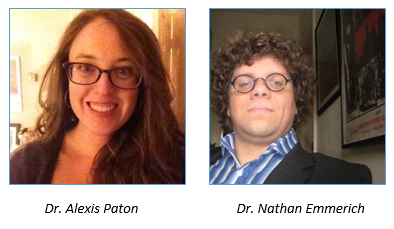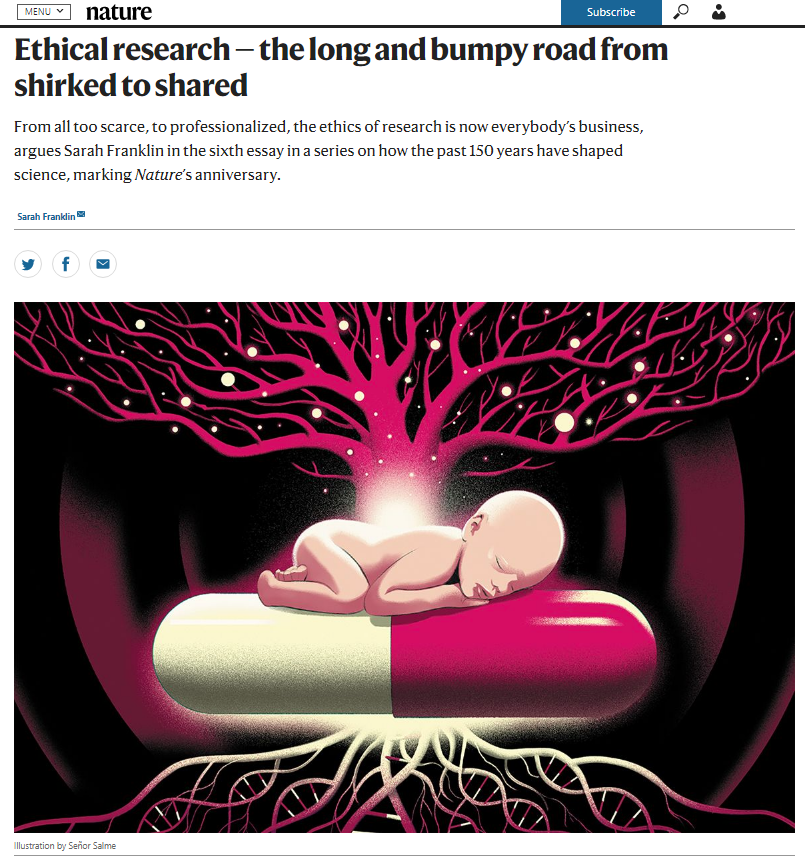EDITOR’S NOTE: This Guest Blog comes to us from bioethicists Dr. Nathan Emmerich and Dr. Alexis Paton in response to a flurry of discussion over Sarah Franklin’s inquiry into bioethics in a recent issue of Nature. Alexis Paton is a Lecturer of Social Science Applied to Health with the SAPPHIRE group at the University of Leicester. She is a Trustee of the Institute of Medical Ethics, and the Chair of the Royal College of Physicians’ Committee on Ethical Issues in Medicine. Nathan Emmerich is Dr Nathan Emmerich is a Research Fellow in bioethics at the ANU College of Health and Medicine.

In a recent essay for Nature, part of a series of editorials marking the journal’s 150th anniversary, Professor Sarah Franklin suggested that “[b]ioethics, once a beacon of principled pathways to policy, is increasingly lost” (p.629). The tenor of her argument is that bioethics is obsolete, and this certainly seems to be the way that some have taken it. However, it is arguably the case that such responses do little more than rush to the defense of only one facet of bioethics, a multifaceted field. Thus, they do not accept what we see as Franklin’s invitation to reflect upon the nature of bioethics, where it has come from and where it might be going. More than this, elements of these responses test the boundaries of propriety in scholarly debate, at least to our ears. Indeed, in one or two places, we had found ourselves questioning whether the same points would be made in the same way about a male author. If only for the sake of brevity we shall leave this issue to one side.
A more fruitful reading of Franklin’s essay emerges when one bears in mind that bioethics is a broader endeavor than explicitly acknowledged by Franklin or apparently presumed by those who have commented thus far. Consider the fact that, despite the initial pronouncement quoted above, Franklin seems to demur from the hardline of bioethics’ obsolescence saying that, like any other field, bioethics evolves and that:
The field no longer relies on philosophically derived mandates codified into textbook formulas. Instead, it functions as a dashboard of pragmatic instruments, and is less expert-driven, more interdisciplinary, less multipurpose and more bespoke. (p.629)
If bioethics has indeed evolved in this way and, presumably, will continue to develop, how should we take Franklin’s suggestion that it is lost? It seems that the target of Franklin’s criticism is applied philosophically-based bioethics, which roots itself solidly in the philosophical tradition. The dominance of philosophy in bioethics was preeminent from the late 1970 until the late 1990s, and philosophy remains a significant component of the field today. This approach to bioethics is a form of applied philosophy or applied ethics, and it certainly seems to be the conception of bioethics that those responding to Franklin are anxious to defend.

It is, however, a mistake to think that this approach—which we might call philosophical bioethics or applied bioethics—amounts to or has ever amounted to the sum total of the field, even if some of its proponents often appear to suggest that it is, or perhaps, should be the case.
Since the turn of the millennium applied bioethics has encountered an increasing level of competition; other forms or modes of bioethical scholarship have proliferated. In some cases, such as certain kinds of empirical ethics, this has not represented a real challenge to applied bioethics. Indeed, it is arguably the case that such methodologies have been consciously designed to be compatible with or subservient to philosophical bioethics.
In other instances—notably the kind of work that is more clearly committed to sociological, anthropological and historical perspectives—there is an underlying theoretical conflict with applied bioethics that is more obvious. As a result many of those who pursue this kind of work have tended to distance themselves from the field, often rejecting the label ‘bioethicist’ and preferring to identify as historians of medicine, sociologists of health and illness, or anthropologists of the life sciences. However, at least some have embraced the label of bioethicists and the field as a whole. Nevertheless, they have often had to fight to be recognized as bioethicists, particularly by those who practice applied bioethics. Even as the field has developed and diversified, applied bioethics has continued to predominate in both numbers and methodological approach.
The question being posed is, then, how applied bioethics should be understood vis-a-vis the field as a whole and, vice versa, how the field as a whole should be understood vis-a-vis applied bioethics. Is it the case that any contribution to bioethics—which, after all, has been presented as an interdisciplinary field of study since its inception or shortly thereafter—should be defined by applied bioethics in some way? Although this need not be taken to suggest that all examples of bioethics should be examples of applied bioethics, it does suggest that such scholarship must comply with certain basic theoretical perspectives, thus actively excluding those fields that differ in terms of their underlying philosophical commitments, such as the distinction between fact and value for example. On this understanding empirical ethics is arguably included within the scope of bioethics. Nevertheless, it excludes what we see as important sociological or anthropological contributions to the field, including the kind of feminist approach Franklin adopts.
Of course, it is not the case that such work is presented by its author as falling within the scope of bioethics, and nor does Franklin claim to be a bioethicist. Nevertheless, it is worth further reflection: is Franklin’s work, and the vast range of other work on bioethical topics that steps beyond the bounds of both ‘philosophical’ and ‘empirical’ bioethics, examples of bioethics? Perhaps we might ask this question another way. Given that bioethics is a multi and interdisciplinary field there is a sense in which it is constituted by the topics or objects of concern that it attends to. On what basis, then, can we say that applied bioethical analysis of, say, various reproductive technologies is an example of bioethical scholarship whereas a more sociological or anthropological enquiry (to name only two possible approaches) is not?
One response might be to say that a sociology of bioethics is not, itself bioethics. This seems to be the line presented by Schuklenk‘s reply to Franklin and those who seem to agree with him. There is a great deal of sociological work on bioethics, but few, if any, have conducted sociological studies of applied bioethicists in academic settings. However, Franklin seems to suggest that what occurs within a clinic or a laboratory is not simply a topic for applied bioethics, but an example of bioethics in itself. To adopt such a perspective is to draw the boundaries of bioethics beyond those of an academic interdiscipline so as to include the ethical dimensions of the practices that go on in both clinics and the laboratories of the life sciences. Equally, we might include various policy-making processes as examples of bioethical endeavours. That we should see bioethics as something more than applied bioethics is, of course, precisely what Franklin is suggesting. And we agree.
It is unfortunate that her essay has been taken as an incitement of bioethics per se rather than being concerned with a certain approach to bioethics. Bioethics continues to be a field divided against itself. The present situation is reminiscent of the time when scientists argued that sociologists and anthropologists of science simply didn’t understand science and how it worked. Applied bioethicists seem to think similarly with regards those who take a sociological or anthropological approach to bioethical topics or, for that matter, to bioethics itself; they don’t really understand applied bioethics or, simply, ethics and moral philosophy.
What is at play here are competing notions of ethics and how it is, or ought to be, understood. Applied bioethicists reserve this appellation for the kinds of analytic normative arguments they endeavour to produce. However, from a more sociological or anthropological perspective ethics is something broader: it is the ways in which we normatively shape the world we inhabit. Consider the notion of moral pioneers and the way in which they normatively shaped the reproductive landscape. As we understand her, it is this kind of normative activity, an everyday ethics, that Franklin is seeking to promote when she suggests that “the most ethical science is the most sociable one” (p.630).
As the title of her piece suggests, scientists once shirked the idea of attending to the ethical dimensions of their research. By saying that “we must all be ethicists now” (p.630) Franklin is enjoining Nature readers to nurture the normative dimensions of the socio-cultural contexts we inhabit. It is a mistake to respond to this claim by reasserting the notion of ethics envisioned by applied bioethics. It is also a mistake to reject philosophy-based bioethics of any kind out of hand. What is required is that we attend to the role that applied bioethics has to play and how it can share in the bioethical life that is, today, an inescapable part of our bioscientific cultures.
We do not, then, set ourselves against the ideas Franklin puts forth in her editorial. Rather, with Franklin, we think that bioethics should be seen as a broader formation than, simply, applied bioethics and its cognate affiliates. Indeed, today bioethics is more than an interdisciplinary and multifaceted field of academic enquiry; it is a dimension of the modern world, a world in which the life sciences and biomedicine have an increasing degree of significance. Neither healthcare nor the biosciences are value free. The possibilities they present are normative in the sense that they shape the way in which we lead our lives; not only do they inform the choices we make, they define many of the choices we are presented with and shape others to in significant ways. We can think of little that is more central to bioethics than attending to this multidimensional facet of modern life.

The question we set out to answer was whether Franklin is a bioethicist, and whether her work falls within the scope of the field; our discussion suggests that we should respond in the affirmative. But let us be clear: there is no need for Franklin to embrace that label for us to understand her work as making a contribution to bioethical debates around reproduction. We should recognize that bioethicists now come to the field from a diverse range of disciplinary backgrounds. The failure to embrace disciplinary pluralism and the associated diversity in theoretical perspectives only pulls down the field as a whole. As Franklin’s essay implies, we are stronger and smarter together.

